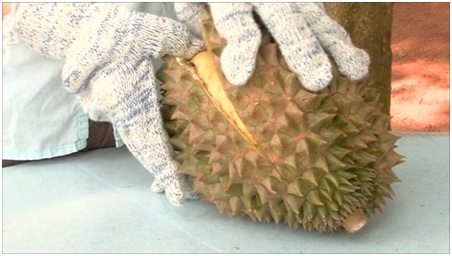MALAYSIA – The spiky, stinky tropical fruit known as the durian is an acquired taste.
As Malaysia begins selling durians to China, farmers here in the southern part of the country hope middle-class Chinese will develop a preference for their home-grown version.
“Our durians are the best. No-one else can compete,” Lim Kock Siong, a third-generation Malaysian fruit farmer of Chinese descent, tells BBC News.
“We are introducing our durian to China. It is a huge market for us. If they come to like our fruit, then the impact on us fruit growers will be enormous,” Mr Lim says, walking through his plantation in the state of Johor.
Malaysia, which started exporting durians to China for the first time on 15 August, is hoping to supplant Thailand as the top supplier of durians.
The sale is another sign that, as the West teeters on the brink of another recession, Asian nations are boosting their trade ties with the world’s second-largest economy.
Mr Lim’s biggest export market is currently Singapore, with a small but wealthy population of dedicated durian eaters.
Now, thanks to changes in Chinese spending power, the farmer is setting his sights on China’s one billion-plus consumers.
 Tai Hui, head of South East Asian research for Standard Chartered Bank, says the entire region is clamouring for a slice of the Chinese market.
Tai Hui, head of South East Asian research for Standard Chartered Bank, says the entire region is clamouring for a slice of the Chinese market.
“In China, with its growing income and growing population, demand for fruits in general is rising very rapidly. It is clearly a new market for Malaysian farmers,” he says.
Business ties
Malaysian fruit farmer Lim Kock Siong hopes China becomes his next big market
Malaysia is China’s biggest trading partner among countries in South East Asia.
Last year, two-way trade reached $74bn (£46bn), from just $50bn in 2009, and is expected to rise to at least $80bn in 2011.
But Malaysia, known for its exports of palm oil and high-tech gadgets, trails far behind rival Thailand in the niche market of selling durians.
For decades, Thailand has dominated the trade, selling $70m dollars worth of durians to China last year.
Asia’s largest economy bought 60% of Thailand’s total durian exports.
The smell of the pungent fruit with its ferociously spiky skin has been variously compared to sewers or even dead animals.
Still, its complex taste, redolent of caramel and fine French cheeses, has earned the durian the monicker “king of fruit”.
Malaysians believe their durians are the creamiest and most delicious in the world, so they are keen to spread that love to their giant northern neighbour.
The country’s Federal Agriculture Marketing Authority says it is planning another durian shipment to China later in September, in the hopes of popularising its fruit.
Big appetite?
But there is a possible downside to engaging China’s juggernaut economy.
Durian lovers in Malaysia have been complaining for years that some of the best fruit is routinely exported to neighbouring Singapore, which offers higher prices.
At fruit farmer Mr Lim’s roadside stall deep in rural Johor, only a few of the smallest and most homely durians are left for sale.
The cream of the crop has been shipped to larger cities or to Singapore, whose populations are dwarfed by China’s.
Malaysian journalist Soo Ewe Jin, deputy editor of The Star newspaper, recently wrote: “Imagine, if only a fraction of the 1.3 billion people in China decide that they prefer durians over mandarin oranges, will there be any left over for us back home?”
Some version of this idea is commonly heard across South-East Asia.
China may present a massive market, but it is not entirely trusted by its trading partners.
The fear, as Malaysia integrates economically with China, is that the country’s potentially enormous appetite may leave slim pickings for locals to buy.
Source: BBC News
